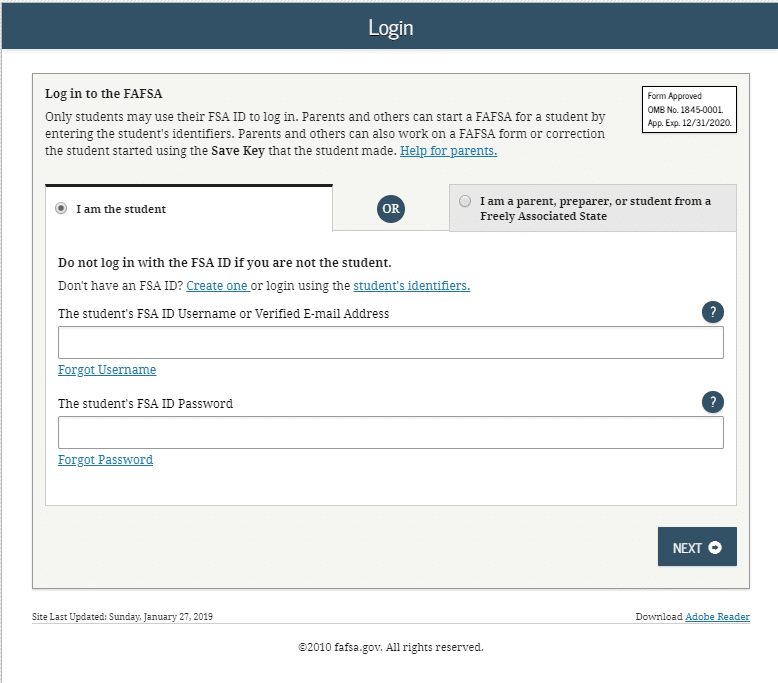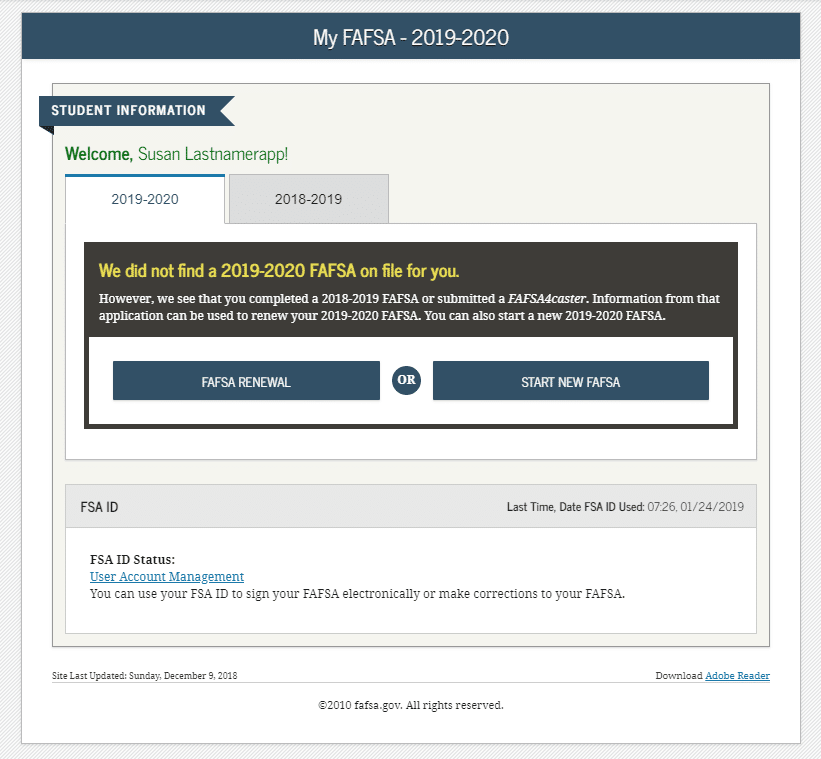Filling out your FAFSA application for the first time last year may have been tough, but we promise, it gets easier. When it’s time to renew your financial aid application, some things are the same, some things are different, and some things you get to skip.
While the process is fairly straightforward, there are some documents and information you’ll want to have on hand when you go through the process, as well as a timeframe you’ll want to follow as much as possible. The FAFSA is an incredibly important tool for students, and understanding the renewal process beforehand will help things run smoothly.
If you need a refresher on the FAFSA, or are applying for the first time, see our previous article, What the Eff is the FAFSA?
1. Gathering your materials
When you sit down to fill out your FAFSA renewal, start by having your FSA ID and password, which you would have acquired when you set up your FAFSA last year. This will allow you to bypass much of the information you already filled out and skip over the questions associated with creating an account.
“The difference with a second time application is that [students] already have their log in. So we always encourage students to have that with them. As long as they have their username and password, then can get into their old FAFSA profile and just say they want to renew their FAFSA,” said Kelsey Ryder, Assistant Director at the University of Iowa Office of Student Financial Aid.
Of course, if you don’t have your FSA ID username and password, there are other ways to access your account without having to start over:

“The other thing that students would need when they sit down to do the FAFSA is, if they’re a dependent student, they need their parents with them or their parents would have to get back in and finish it later,” said Ryder.
A dependent student would need their parents with them or their parents to fill out sections later as much of the information needed has to do with the parents’ updated tax records. Parents will need to have their own FSA ID and password that they would have previously created as well in order to fill out the information.
“The final piece would be tax information for the parent and student. For this coming school year it’s the 2019/2020 FAFSA, so they’d need their 2017 tax information,” said Ryder.
Essentially, you will need the information to update your tax records through the previous year.
“Those are the key pieces–the login information and the tax information. If they have that, it should be pretty straightforward,” said Ryder.
2. Deadlines
The FAFSA for the 2019/2020 opened October 1, 2018 and technically remains open until June 30, 2020. However, many schools require an earlier deadline, or have a priority deadline in order for students to be renewed for scholarships and grants associated with their financial aid application.
“The earlier the better. Regardless of school it’s good to file early,” said Ryder.
Ryder explained that it’s best to get your FAFSA in as soon as possible in case any issues come up with your application, as you may then need to supply additional information, which takes time. So, in order to make sure you meet deadlines for any scholarships and the financial aid itself, submitting early gives you space in the event that there are more steps to complete your application.
3. Filling out the application
Once you have your login information, tax information, and parents’ information, you will be able to apply for your FAFSA renewal. Visit the Federal Student Aid office website to log into your account and begin the process. When you log in, you will notice that you are able to skip questions because they are pre-populated with information you’ve already provided.
This screengrab from Edvisors shows how you will be prompted to renew your FAFSA once you log in, rather than starting over.

Information that is pre-populated will be mostly demographic information, such as your name, birthday, where you went to high school, etc., as well as your parents’ demographic information if you are a dependent student. So, you will just read over this information to make sure it is all still correct before moving onto the new information you will have to fill out.
Moving onto tax records, again, you will simply be updating for the previous year. You will have this information from when you and/or your parents filed your taxes in the spring of last year. In the case of the 2019/2020 school year, the FAFSA opened up on October 1, 2018. So, you will report the taxes you filed in April of 2018.
Finally, you will need to update any changes to your student status, such as your grade level, if you are moving from undergraduate to graduate status, if your dependency changes, etc. The application will prompt you to fill out these changes.
4. After you submit
After this information is complete, your FAFSA is ready for review! However, there are a few situations where more or different information may be required.
A student may be selected for verification, meaning that the school and/or Federal Student Aid office requires more information to verify that reported tax records are accurate. Often, students are selected randomly for verification, so this does not always mean that something was filled out incorrectly. But, this could also mean that records provided were inconsistent or incomplete, so double check that everything you fill out on the FAFSA is accurate so that you are less likely to be asked to complete this additional step.
Another thing to keep in mind is that students whose parents do not have a social security number will have to complete some of the application differently, and their parents will use a paper signature to verify instead of entering information through their own account. However, if you have done this during your first application process, the steps for a parent are identical the second time around.
Filling out the FAFSA can seem daunting–especially if it was difficult for you the first time you applied. But knowing what you will need to renew your application, as well as the fact that you won’t have to repeat a lot of the information that you already filled out, will help the process run smoothly. If you are confused about anything in your application, visit your university’s Office of Student Financial Aid. They are experts on the FAFSA and will be able to answer any specific questions you may have.



